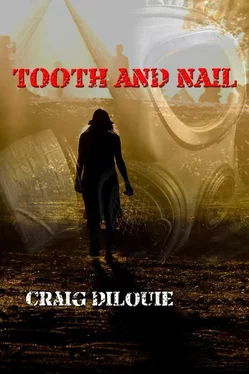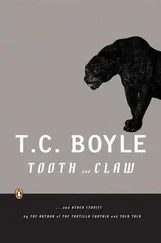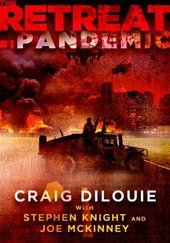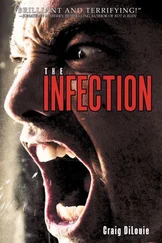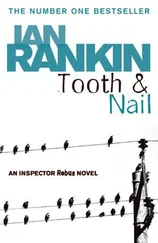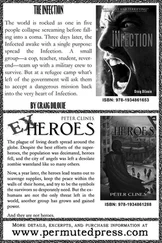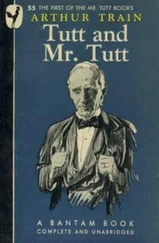That is how close she is. Closer even than Petrova initially thought.
“Come and get me! Please!”
And if she keeps this up, she is going to get herself killed or infected.
Petrova formulates a plan on the spot. She knows where the door is and believes she can find it in the dark easily. She will open it and guide Cohen to safety using her voice before the woman’s screaming brings every Mad Dog in the place running.
Only she doesn’t move. She is literally frozen with fear.
Cohen is still shouting for help.
Petrova begins to crawl back under the operator’s desk, burrowing into the wires and the dust and the cobwebs and the residual heat of the electronics.
The last thing Petrova hears before she falls asleep is the horrible sound of a struggle that she takes into her dreams with her.
Chapter 8
We are the world’s most powerful military
and we are being beaten on our own ground
Lieutenants Bowman and Knight, joined by their platoon sergeants Kemper and Jim Vaughan, stand on the roof of the Samuel J. Tilden International Middle School, which their units have cleared and secured, and listen to the gunfire in the city.
The school is only a couple of stories tall but even this high up, they have an almost antiseptic view of the city’s Midtown district. The buildings block their view of the wholesale slaughter going on at the street level of the city. But they can hear it.
To Bowman, leaning against the parapet and gazing out into the smoky haze produced by scores of unchecked fires, it is as if New York itself were a giant body, its people healthy cells one by one being converted into virus that is beating the crap out of the body’s immune system.
And to carry this analogy further, the immune system, well, that would be two brigades of infantry of the U.S. Army, about six thousand men and women in all—each a highly trained and heavily armed lean, green fighting machine.
We are the world’s greatest military and we are being beaten on our own ground, he thinks. By the people we swore to protect, armed only with tooth and nail.
On the other side of the roof, Sergeant Lewis fires his M21 sniper rifle. He is up here fighting his own private war, shooting Mad Dogs down in the street behind the school.
“I still can’t believe it,” Knight says. “Is this really happening?”
“It’s a numbers game, Steve,” Bowman tells him. “You take five guys who develop Mad Dog symptoms. They each bite one other person and that one other person turns into a Mad Dog. Then that person bites somebody else. Every couple of hours.”
Knight whistles. “Jesus, do the math!”
“Suppose just ten percent of the population of this city becomes a Mad Dog. Just one out of ten. And then suppose we had the men and the weapons and a safe position to shoot them down from.”
Knight finishes for him. “There aren’t enough bullets.”
Bowman nods. “It’s a numbers game. There’s no way to stop this. It’s only going to get worse. In a few hours, maybe a day, ten percent becomes twenty percent. A flood.”
Across the street, a civilian in a private office has noticed them and is holding up a sign against his window that says: trapped, help.
The officers move to another part of the roof, seething with shame.
They can only help those they can without risking the security of the unit. For a moment, Bowman thinks of Reinhold Niebuhr’s Serenity Prayer, which his uncle Gabe, a recovering alcoholic in AA, taught him when he was ten years old: God, grant me the serenity to accept the things I cannot change, courage to change the things I can, and wisdom to know the difference.
“Who could pull the trigger that many times anyhow?” Knight wonders.
“Private Chen couldn’t,” Bowman murmurs. The soldier wouldn’t be the last who would rather eat a bullet than fight this war, either.
Knight continues, “One of the reasons we got chewed up so bad all the way here is some of my boys just couldn’t shoot Americans.” He glances at his platoon sergeant, then looks away. “Have you, uh, shared your discovery with your platoon?”
“They’re not dumb,” Bowman says. “They know what’s going on. It’s just that nobody’s said it out loud for them yet. They haven’t had a minute to think about it.”
“Yes,” says Knight.
“I guess we’ll have to tell them.”
They flinch as the muffled boom of an explosion reaches their ears. A large cloud of smoke and dust billows out from behind a building between them and Times Square. Even yesterday, this would have been remarkable to them. Today, they take it in stride.
Knight laughs viciously. “We’re going to tell them how their families, and everybody they know, are probably dying or being converted into those things out there.”
“We’re going to tell them to do their jobs, Steve.”
Lewis fires his rifle, which discharges with a loud bang.
“It’s getting personal, Todd. You better come up with something better than that if you want them to keep fighting for a country that’s falling apart around them.”
Bowman looks at Knight in surprise. “Why me?”
Knight smiles sadly. “You’re the one who’s in charge here, Todd.”
“We’re the same rank, but you’ve got seniority over me. You’ve got seniority over Greg Bishop of First Platoon, too. You’re in command.”
“On the way over here . . .” Knight looks at Sergeant First Class Vaughan, who stares back at him stonily, his expression inscrutable behind his N95 mask. “I was one of the people who couldn’t shoot. I couldn’t even give the order. I froze. It was Sergeant Vaughan here that got us out.”
“Damn, Steve,” Bowman says quietly.
He glances at Vaughan, but the NCO is a professional and while his face is flushed, making the diagonal scar across his face livid, his gray eyes give nothing away.
Knight says, “A lot of my boys are dead because I couldn’t tell them to shoot.”
Tears stream down the officer’s face. Vaughan lowers his eyes. Knight looks away, gazing at the skyscrapers.
“Twenty-five percent casualties,” he adds. “But you know what?” He hisses, fiercely, “If I could go back and do it all over again, I still wouldn’t give that goddamn order.”
Bowman says nothing. He had given the order to shoot. He personally not only shot Mad Dogs, he also shot down uninfected civilians who got in his way.
By any definition, he is a murderer and a war criminal. He knows it. His own platoon sergeant knows it. The two men were made from the same stuff; he saw Kemper do the same as him to get the platoon out of the riot and to safety.
And if they did not do what they did, if they were not war criminals, they might all be dead right now.
Nevertheless, he can’t shake the feeling that he is damned.
The officers hear the piercing wail of a fire engine, punctuated by the bursts of its horn. It is a plucky sound amid the rattle of small arms fire and distant screams, reminding them that somewhere, out there, people are still fighting back against the rising tide of violence and anarchy.
The sound reminds them that it is not every man for himself out there. Not yet.
Similarly, the power continues to cut in and out, but somebody is still manning the controls at the power plant, and somebody is still delivering coal to burn to make electricity. In all the jobs that matter, from cop to soldier to paramedic to power plant operator, people are still doing their duty. Bowman finds strength in this idea.
Knight wipes the tears from his face and clears his throat.
“I wouldn’t give the order,” he says. “I guess that makes me a nice guy or something. But I have no right to lead Charlie.” He sighs. “We should have stayed where we were. We were doing some good there.”
Читать дальше
